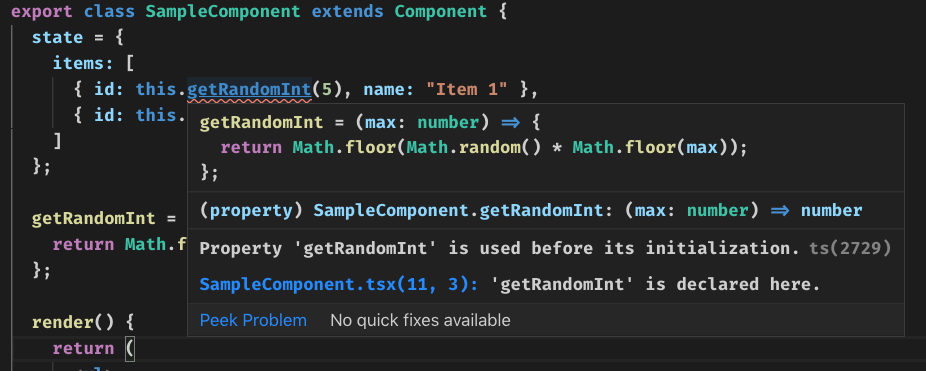Initializing state using class field declaration
If you want to initialize state in a class based component we have two options:
- In constructor
- As a class property
For class based components I used to initialize state in the constructor:
import React, { Component } from "react";
export class SampleComponent extends Component {
constructor(props) {
super(props);
this.state = {
items: [
{ id: this.getRandomInt(5), name: "Item 1" },
{ id: this.getRandomInt(5), name: "Item 2" },
],
};
}
getRandomInt = (max) => {
return Math.floor(Math.random() * Math.floor(max));
};
render() {
return (
<ul>
{this.state.items.map((item) => (
<li key={item.id}>
{item.name} - {item.id}
</li>
))}
</ul>
);
}
}
This approach is fine, but you will have to make sure you call super(props). Sometimes we might forget to call super(props) in the constructor; in this case, the parent’s constructor won’t be executed, which will cause the following error:
ReferenceError: Must call the
super(props)constructor in derived class before accessing ‘this’ or returning from derived constructor
It’s where using class field declaration comes in handy. It saves us a few keystrokes, so you don’t need to worry about calling super(props) anymore. So the previous example can be written as:
import React, { Component } from "react";
export class SampleComponent extends Component {
getRandomInt = (max) => {
return Math.floor(Math.random() * Math.floor(max));
};
state = {
items: [
{ id: this.getRandomInt(5), name: "Item 1" },
{ id: this.getRandomInt(5), name: "Item 2" },
],
};
render() {
return (
<ul>
{this.state.items.map((item) => (
<li key={item.id}>
{item.name} - {item.id}
</li>
))}
</ul>
);
}
}
The key point to remember here is that if you are going to call a method inside the state (getRandomInt in our case), you must declare your methods before declaring the state otherwise you will get the following error:
TypeError: this.getRandomInt is not a function
If you are using TypeScript then it has got your back and immediately yelling at you:
